Good morning!
Greetings in the name of the Father, the Son, and the Holy Spirit.
“Now go and call together all the elders of Israel. Tell them, ‘Yahweh, the God of your ancestors—the God of Abraham, Isaac, and Jacob—has appeared to me. He told me, “I have been watching closely, and I see how the Egyptians are treating you. I have promised to rescue you from your oppression in Egypt. I will lead you to a land flowing with milk and honey—the land where the Canaanites, Hittites, Amorites, Perizzites, Hivites, and Jebusites now live.”’ (Exodus 3:16-17)
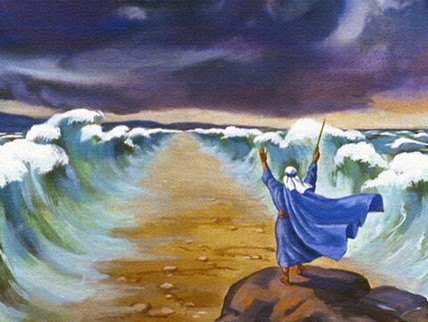
Finally, Moses met God, for whom Moses worked so hard by dedicating all that he had for the first forty years of his life. Moses firmly believed and initiated God’s mission to rescue his fellow Israelites as the towering top prince of Egypt. However, God did not accept Moses’ plan and let Moses fail. His people rejected Moses. He had to flee from his people.
Moses killed one Egyptian slave driver, who was harshly beating one of the Israelites in slavery as a signal to lead his fellow Israelites, but they treated Moses as a threat who would also kill them. Soon Pharaoh realized what Moses did and ordered to arrest Moses to execute Moses. By that time, Moses had already fled to the land of Midian, a wilderness where nobody in Egypt would want to go.
As wondering in the Median wilderness, Moses felt he was alone, but God was with Moses. Ahead of Moses, God prepared a way for Moses. Moses met one family in the land of Midian. He settled and started his family. Moses lived forty years there and forgot his past. Then he became a humble and faithful shepherd who took care of his family and sheep. Moses was no longer the person Moses used to be – the towering, capable, top prince in Egypt. He was nobody living in the wilderness of Midian.
Indeed, God was waiting for the new Moses throughout the forty years. Then God appeared to Moses and gave God’s command to go back to rescue the Israelites in slavery in Egypt. What was Moses’ response to God?
Moses refused and refused, but God insisted and convinced Moses. Finally, Moses excuses that he could not speak to his people who once rejected him before. So God promised to send a helper who would speak for Moses. The helper was his older brother, Aaron. For this time, Moses got a helper, and had God’s staff that performed God’s miraculous signs in his hand. Then God left Moses.
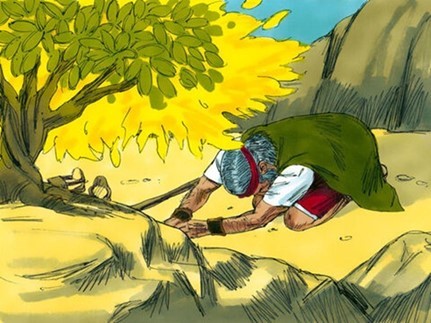
God also prepared the hearts of Moses’ wife and his father-in-law. Moses said his decision to go back to Egypt immediately supported Moses’ decision without further question. From the father-in-law’s point of view, sending away his daughter with his son-in-law and his precious grandchildren was not easy. Moses’ father-in-law, Jethro, gave his blessing. Moses’ wife agreed to leave behind all her life that she built together with Moses for the last forty years and decided to go with Moses to Egypt. She knew Moses was once rejected by his own people, which was the very reason why Moses came to the land of Midian. Moses’ wife, Zipporah, gave all the support she could provide, and Moses thanked God.
Moses took his wife and sons, put them on a donkey, and headed back to the land of Egypt. In his hand, he carried the staff of God. What a determination of Moses and his wife, Zipporah! Then God appeared again to Moses and told,
“When you arrive back in Egypt, go to Pharaoh and perform all the miracles I have empowered you to do. But I will harden his heart so he will refuse to let the people go. Then you will tell him, ‘This is what God says: Israel is my firstborn son. I commanded you, “Let my son go, so he can worship me.” But since you have refused, I will now kill your firstborn son!’”
God gave a warning about Pharaoh, who would not listen to Moses. God would harden the heart of Pharaoh so Pharaoh would refuse to let the Israelites go. It sounds very strange. Why? Out of God’s mercy and love, God told what would really happen. But in the end, God would fulfill God’s will by even killing Pharaoh’s firstborn son.
On the way to Egypt, at a place where Moses and his family had stopped for the night, God confronted him and was about to kill him. Why? Did God have to kill Moses? Moses had his sin. He did not circumcise his sons although Moses knew God’s covenant of circumcision. Moses, indeed, cared more for the relationship with his wife and his father-in-law’s family than that for God. Moses could not speak up circumcision of his sons and buried in his heart. It was impossible to do God’s monumental work, still having sin in his heart. God confronted Moses, but Moses’ wife, Zipporah, quickly responded. She took a flint knife and circumcised her son. She touched his feet with the foreskin and said, “Now you are a bridegroom of blood to me.” When she said “a bridegroom of blood,” she was referring to circumcision. After that, God left him alone.

What a wife! Zipporah wisely and quickly demonstrated her full acceptance of God and her faith. Moses could not be happier as he saw what Zipporah did. Moses gave thanks to God for Zipporah, who was no longer a foreigner before God with Moses. Moses, then, traveled with Zipporah and his circumcised sons. On his hand, he had the staff of God.
As Moses traveled back to Egypt, the forty-year-old memories buried in his heart vividly came back. It was truly painful. He was no longer alone, but now Moses had his wife truly supporting him and the staff of God. All helped Moses to travel back to Egypt despite all painful memories. Whenever Moses could not help himself, Moses looked at his wife and the staff of God on his hand. Moses knew God was with him, and his wife, Zipporah, supported him. He fled out of Egypt alone, but he was returning to Egypt with God and Zipporah.
Moses was getting closer to Egypt, less than a one-day trip distance. God came to Aaron, Moses’ brother, and said, “Go out into the wilderness to meet Moses.” It shocked Aaron. Aaron had never met God before and just heard about Moses, who he did not see for the last forty years. Aaron knew Moses’ bitter failure. After his failure, Moses disappeared into the wilderness of Midian. That’s the last time that Aaron saw Moses.
Aaron only could remember Moses, who used to be the top prince in Egypt, but he fled after killing one slave driver. Aaron always felt that it was tragic that his fellow Israelites did not embrace Moses as a liberator who would rescue them from slavery. However, he could not do anything because the rest of the Israelites rejected Moses. However, Aaron truly missed his younger brother. At that time, Aaron believed Moses would do monumental work for the Israelites, and Moses was capable. It did not work out as Aaron wanted. Forty years was a long time. Aaron forgot Moses, and Moses forgot the past.
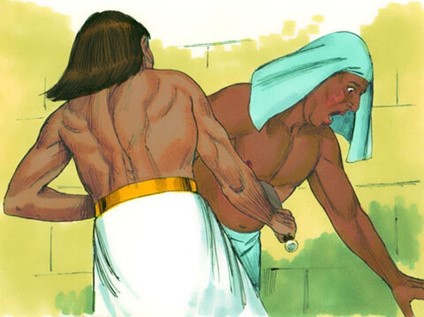
When Aaron heard about Moses from God, he could not believe what he heard. He thought that Moses was either dead or completely forgot about him and his fellow Israelites. Aaron thought that he would die without hearing about Moses again.
Aaron truly wanted to see Moses again as a brother. Aaron also wondered whether Moses had truly overcome the past failure that destroyed his brother’s life. It was not time to debate whether Moses had overcome or not. Aaron gave thanks to God, and he ran to the wilderness spot where he last saw Moses leaving Egypt forty years ago. Aaron ran deep into the spot leading to the land of Midian, expecting to see his younger brother, Moses.
Aaron ran, looking forward to seeing his brother, Moses. It did not take long before Aaron could see a group of people coming. Two rode on donkeys, and one was leading on foot. As getting closer, Aaron could not believe his eyes. The person leading was his brother, Moses. How could he forget his brother’s face? Aaron immediately recognized Moses. But he was no longer a young and energetic person. Moses was a man at the age of eighty. He was a truly competent man as the top prince in the mighty nation of Egypt, but Moses looked like an ordinary shepherd who tendered sheep for many years.
Aaron ran to Moses, and Moses saw Aaron running toward him. Moses shouted, “Aaron, my brother, it is Moses, your younger brother!” Moses gave thanks to God. As God promised, God sent his brother, Aaron. Yes, Aaron was no longer a young man but an aged man who lived a hard life as an enslaved person in Egypt. They ran to each other and hugged for a long time without saying anything. Neither Aaron nor Moses knew how long they hugged each other. Moses’ wife, Zipporah, silently watched two brothers with her sons.
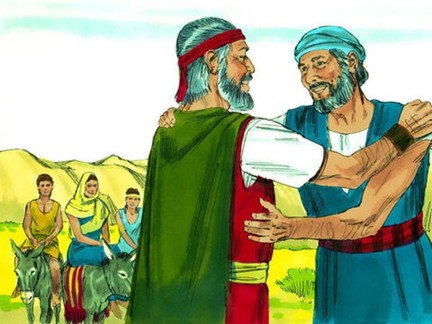
Moses introduced his wife, Zipporah, and his sons, Gershom and Eliezer. Aaron was so glad to meet Moses’ wife and his sons. It was a beautiful family reunion after forty years of separation. Aaron was about to talk about God, who appeared to him to go to the wilderness and to meet Moses because Aaron through that Moses did not know why he came out to the middle of the wilderness. Moses immediately answered with a bright smile on his entire face. Moses then looked up and thanked God, who brought his brother, Aaron, as He promised.
Moses then told Aaron everything God had commanded him to say. And Moses told Aaron about the miraculous signs God had commanded him to perform. Aaron heard God’s plan. Aaron gave thanksgiving in awe, and Aaron understood why God sent him to the wildness to meet Moses. Aaron now understood why God appeared to him and commanded to go out to the wilderness to meet Moses. Every evening they together cried out to God. The harsh and cruel treatment of the current Pharaoh and his slave drivers was gone too far. God surely heard their cry!
Aaron was deeply moved by God, who really heard the contrite prayer to God while asking for freedom from slavery in Egypt. Aaron realized that all his and the fellow Israelites’ prayers went directly to God, and God heard all. Aaron felt that God was deaf or ignored all the prayers. If not, why was one day the same as yesterday, and yesterday was the same as the day before yesterday? Aaron felt that God might answer the prayers a thousand years later, and he would never see God’s hand during his lifetime.
But you must not forget this one thing, dear friends: A day is like a thousand years to the Lord, and a thousand years is like a day. (2 Peter 3:8)
Aaron was wrong. Aaron did not believe in God wholeheartedly. Aaron examined his heart, and realized that his faith was too shallow.
The apostles said to the Lord, “Increase our faith!” And the Lord said, “If you had faith like a mustard seed, you would say to this mulberry tree, ‘Be uprooted and be planted in the sea’; and it would obey you. (Luke 17:5-6)
It wasn’t easy having faith without seeing. God full of mercy and love gave what he and his fellow Israelites prayed about, although they had little faith. As realizing this, Aaron prayed in his heart for God’s forgiveness. He prayed, but he did not truly believe. Then he asked God’s grace to increase faith. Aaron truly experienced who God was, and his heart was filled with joy because he found God who listened to his prayer, and answered. It was a transforming experience for Aaron that sustained Aaron throughout many ups and downs during the long, draining negotiation with Pharaoh and Moses’s rest of his life journey. Out of the unforgettable experience, Aaron became Moses’ true partaker and helper for God’s monumental work liberating the Israelites in slavery in Egypt. At that time, about two million Israelites were living in Egypt. In faith, Moses and Aaron led the Israelites to the land of milk and honey that God prepared for His people.
Aaron and Moses hurried back to Egypt. As getting close to Egypt, the past memory pressured down Moses, but he looked at the staff of God in his hand and his wife and his sons. How trustful his older brother, Aaron, was! Aaron was leading the way. Moses clearly knew God was going with him, the Almighty and Faithful God – the God of Abraham, Isaac, and Jacob. God was real, who was living and dearly loved His people.
Moses looked around. Many things were changed. There were many new monuments and buildings that he had never seen. However, one thing had not changed: the Israelites’ living conditions. They lived in the same terrible places while laboring for the Egyptians. They were born enslaved, lived as enslaved people, and died as enslaved people. The Egyptian slave drivers equally treated his fellow Israelites harshly. Moses again saw the Egyptians whipping his fellow people. It reminded Moses of the scene the slave driver beat his fellow Israelites to almost death. As Moses watched, it looked even harsher than forty years ago. Moses became truly sad for his fellow Israelites while walking with Aaron through his enslaved Israelites following him.
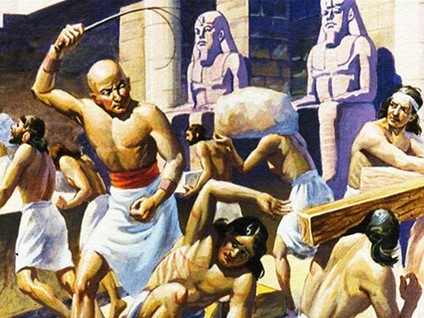
Then Aaron called all the elders of Israel together. Moses was tense initially, but he soon became calm. Moses could not find anyone whom he used to know. Moses did not want to confront the same people who confronted Moses while shouting at Moses, “ “Who appointed you to be our prince and judge? Are you going to kill me as you killed that Egyptian yesterday?” As he remembered the scene, Moses felt a mental breakdown. But God helped Moses.
Aaron raised his hand and introduced Moses. Some vaguely remembered Moses by the name only. That was it. Then Aaron told all the elders of Israel everything God had told Moses. Aaron was an eloquent speaker, and all carefully listened to Aaron, which made all nod. Then Moses stood up and performed the miraculous signs as they watched. They had never seen such miracles. Moses lowed his staff in his hand on the floor, and it became a snake. All stepped back from the snake in fear. Moses took the snake by the tail, but the snake did not bite Moses. Instead, it turned back to Moses’ staff again. All praised God for God appeared to Moses and gave His Name – “I Am Who I Am,” who was the God of their ancestors—the God of Abraham, Isaac, and Jacob.
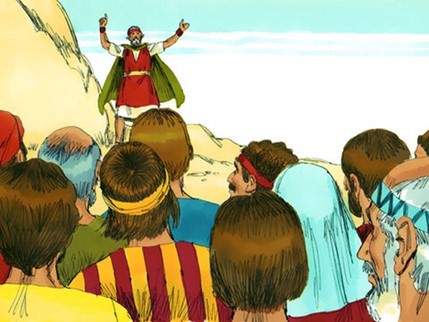
All the elders of Israel along with the rest of the Israelites were convinced that God had sent Moses and Aaron. When they heard that God was concerned about them and had seen their misery, they bowed down and worshiped. Finally, they head God’s answer with their own ears. They also saw God’s marvelous signs, and all were filled with joy. They praised God. None left the place for the rest of the evening till the next morning. All looked at each other in awe and thanksgiving because God was truly living and answered their prayer, despite their little faith. Thus, they truly prayed in faith. As they were praying, they felt the peace of God that transcended all understanding.
Yes, God is real and the living God even today at this moment. If not, we would have told you so. God loves all of you because you are God’s children. Sometimes we feel that God is indifferent, and our prayers disappear into a void space without reaching God. No! God dearly loves us and carefully listens to every prayer of ours, word by word, without exception. God answers our prayers one by one. Why? God dearly and madly loves us. Therefore, we will surely see God’s almighty and loving hand according to His infinite goodness. We will experience His marvelous works done by God in our lives.

Remember His marvelous works which He has done, His wonders, and the judgments of His mouth, (1 Chronicle 16:12)
